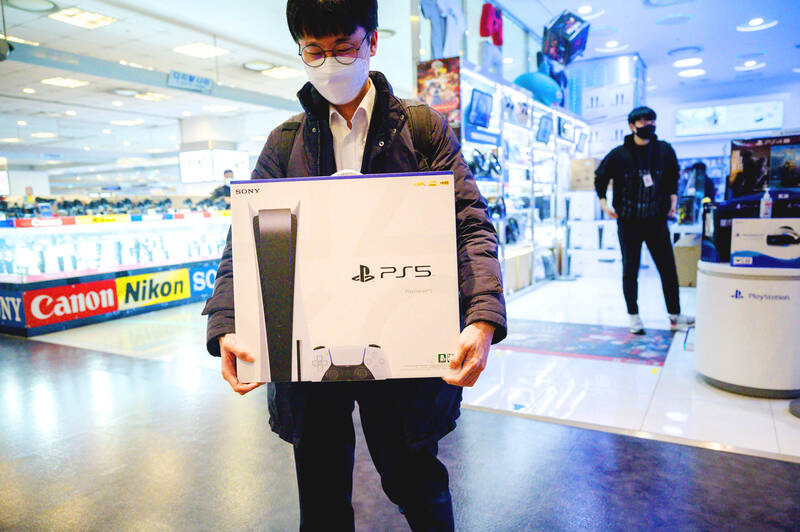Sales of Sony Group Corp’s PlayStation 5 (PS5) have crossed 50 million units, the Japanese electronics giant said yesterday, pointing to “strong momentum” this year for its flagship gaming console.
The PS5 was launched in November 2020, with the world in the grip of the COVID-19 pandemic, and its sales initially suffered because of widespread supply chain problems and a global chip shortage.
Still, the PS5 reached the 50-million-unit milestone in almost the same period as its predecessor, the PS4, with Sony saying its flagship console enjoyed “strong momentum” this year.

Photo: AFP
“We’re thrilled that this is the first holiday season since launch that we have a full supply of PS5 consoles — so anyone who wants to get one can get one,” Sony Interactive Entertainment chief executive officer Jim Ryan said in a statement.
Since releasing the first PlayStation in 1994, Sony has grown into a titan of console gaming, a market whose revenue this year has been estimated at more than US$53 billion by industry consultancy Newzoo.
The PS2 remains Sony’s bestselling console with more than 155 million units sold, while the PS4 exceeded 117 million, the company said.
“This is an eye-popping number, given the PS5 hasn’t even been properly available at retail for half of its life cycle,” Tokyo-based industry consultancy Kantan Games Inc chief executive officer Serkan Toto said of the 50 million units sold. “In the end, Sony might actually be able to top the astonishing PS4 lifetime sales.”
The PS5 milestone caps a strong year in gaming for Sony.
In October, Marvel’s Spider-Man 2, developed by Sony-owned Insomniac Games Inc, became the fastest-selling PlayStation Studios game in the first 24 hours after release.
Sony said that the PS5 also enjoyed a boost this year from the success of games including Baldur’s Gate 3 and Alan Wake 2.

CAUTIOUS RECOVERY: While the manufacturing sector returned to growth amid the US-China trade truce, firms remain wary as uncertainty clouds the outlook, the CIER said The local manufacturing sector returned to expansion last month, as the official purchasing managers’ index (PMI) rose 2.1 points to 51.0, driven by a temporary easing in US-China trade tensions, the Chung-Hua Institution for Economic Research (CIER, 中華經濟研究院) said yesterday. The PMI gauges the health of the manufacturing industry, with readings above 50 indicating expansion and those below 50 signaling contraction. “Firms are not as pessimistic as they were in April, but they remain far from optimistic,” CIER president Lien Hsien-ming (連賢明) said at a news conference. The full impact of US tariff decisions is unlikely to become clear until later this month

Popular vape brands such as Geek Bar might get more expensive in the US — if you can find them at all. Shipments of vapes from China to the US ground to a near halt last month from a year ago, official data showed, hit by US President Donald Trump’s tariffs and a crackdown on unauthorized e-cigarettes in the world’s biggest market for smoking alternatives. That includes Geek Bar, a brand of flavored vapes that is not authorized to sell in the US, but which had been widely available due to porous import controls. One retailer, who asked not to be named, because

CHIP DUTIES: TSMC said it voiced its concerns to Washington about tariffs, telling the US commerce department that it wants ‘fair treatment’ to protect its competitiveness Taiwan Semiconductor Manufacturing Co (TSMC, 台積電) yesterday reiterated robust business prospects for this year as strong artificial intelligence (AI) chip demand from Nvidia Corp and other customers would absorb the impacts of US tariffs. “The impact of tariffs would be indirect, as the custom tax is the importers’ responsibility, not the exporters,” TSMC chairman and chief executive officer C.C. Wei (魏哲家) said at the chipmaker’s annual shareholders’ meeting in Hsinchu City. TSMC’s business could be affected if people become reluctant to buy electronics due to inflated prices, Wei said. In addition, the chipmaker has voiced its concern to the US Department of Commerce

STILL LOADED: Last year’s richest person, Quanta Computer Inc chairman Barry Lam, dropped to second place despite an 8 percent increase in his wealth to US$12.6 billion Staff writer, with CNA Daniel Tsai (蔡明忠) and Richard Tsai (蔡明興), the brothers who run Fubon Group (富邦集團), topped the Forbes list of Taiwan’s 50 richest people this year, released on Wednesday in New York. The magazine said that a stronger New Taiwan dollar pushed the combined wealth of Taiwan’s 50 richest people up 13 percent, from US$174 billion to US$197 billion, with 36 of the people on the list seeing their wealth increase. That came as Taiwan’s economy grew 4.6 percent last year, its fastest pace in three years, driven by the strong performance of the semiconductor industry, the magazine said. The Tsai